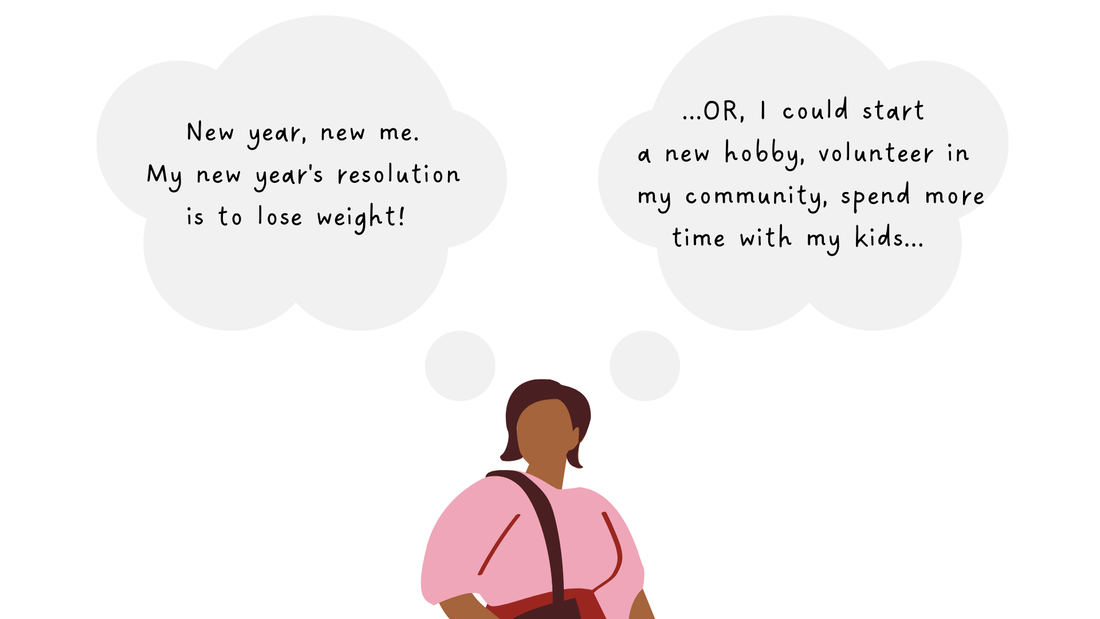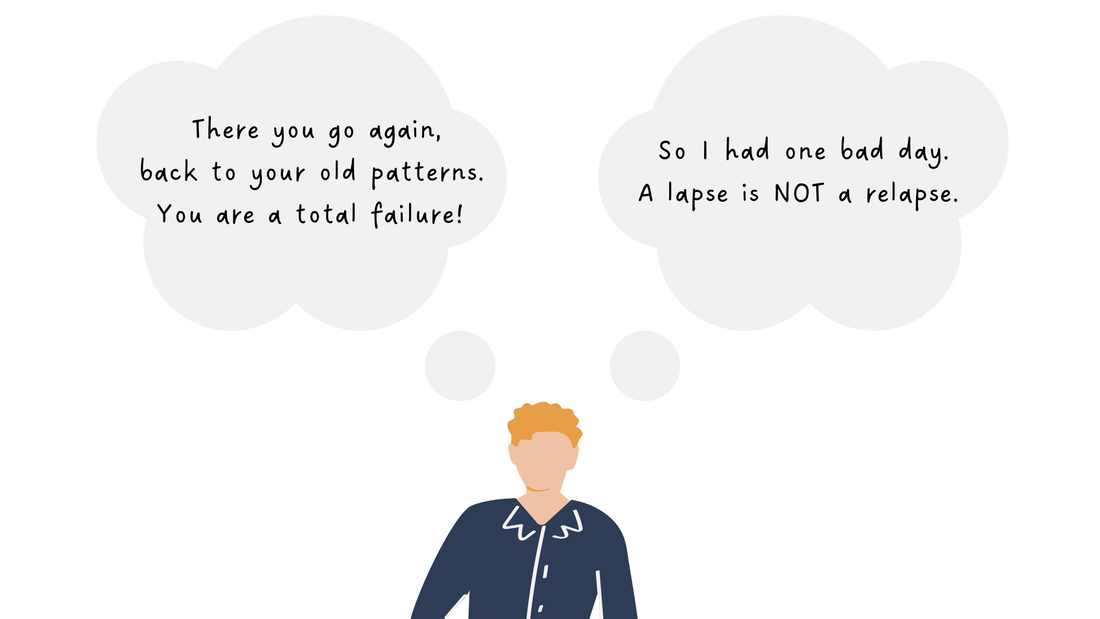|
Written by Julia Nicholas, B.S., First Year EAT Lab Graduate Student For many people, the holiday season brings gatherings with loved ones, cherished traditions, and a break from our everyday routines. If you are in recovery from an eating disorder, you may find that you have an uninvited plus-one tagging along to holiday gatherings: your eating disorder. Let’s talk about some strategies for talking back to eating disorder thoughts that may come up during the holidays. Navigating Holiday Meals It’s no surprise that many holiday traditions revolve around food. Food provides nourishment, connects us with our cultural heritage, and gives us a practical reason to gather: to cook and eat together. All this focus on food can be stressful for someone with an eating disorder. Holiday meals may disrupt your eating routine and you may worry that special holiday foods are “unhealthy” or that eating them will cause you to gain weight. It may be tempting to eat less in anticipation of holiday meals. It’s important to remember that regular eating is a crucial part of eating disorder recovery. For example, it helps prevent the cycle of restriction and binge eating (Fairburn et al., 2003). Following your regular eating schedule, including all your meals and snacks, can actually help you enjoy special holiday foods in moderation, because you will be less likely to feel extremely hungry and out of control while eating them. Continuing to eat regularly can help you live in line with your values, for example, by giving you the energy to spend quality time with your family and create treasured memories. Reconnecting with Loved Ones  Reconnecting with family and friends you haven’t seen in a long time may bring up concerns about your physical appearance. It doesn’t help that the first thing many people say when seeing someone after a long time apart is something along the lines of, “You look great!” In these situations, it may feel like there is a magnifying glass on your weight. Pause for a moment and think of someone you care about. Now, imagine you’re going to spend time with them for the first time in months. What do you look forward to? Their sense of humor, their knack for storytelling, their warm hugs? Now, put yourself in the other person’s shoes. What are they looking forward to about spending time with you? I’m willing to bet that the reasons your people love you have nothing to do with your appearance or your weight. So why is physical appearance often the first thing people comment on when there are so many more important aspects of who we are? Because diet culture teaches us that weight is an indicator of health or moral goodness (news flash: it’s not), people sometimes attribute deeper meanings to weight that are simply not true. These beliefs about weight are deeply ingrained in society. While there are ways you can fight diet culture, sometimes it can be helpful to accept that others are in different places in their personal journeys to freedom from diet culture. If someone judges you based on your weight – or any aspect of your appearance – that says more about them than it does about you. People may also bring up weight or dieting as a topic of conversation. If someone tries to talk about weight over the holidays, you can set a boundary and change the subject: “I’d rather not talk about weight. Have you watched any good TV shows lately?” Alternatively, if the thought of setting a boundary with the other person is daunting, you can start by setting an imaginary boundary. Imagine the other person trying to hand you all their body image angst. Say, “Thanks, but no thanks,” and hand it right back to them. Their overvaluation of weight is their work to do – not yours. Another way to practice acceptance is by using “maybe, maybe not,” a strategy from Acceptance and Commitment Therapy (ACT). This response to eating disorder thoughts can help you accept uncertainty in a situation – for example, when you worry that someone might be judging you based on your weight. Maybe they are, maybe they aren’t. You can go on enjoying the holiday either way. Setting New Year’s Resolutions The new year provides an opportunity to reflect on our goals for personal growth. Unfortunately, diet culture has many people convinced that they should make weight loss their New Year’s resolution. Despite the fact that diets don’t work, the dieting and fitness industry profits enormously from weight-loss New Year’s resolutions when people sign up for new gym memberships and dieting programs every January. It can certainly be tempting to set a weight-loss resolution, especially when it seems like everyone else is doing it. Ask yourself: What are you hoping to gain by losing weight? Are you striving for happiness, confidence, health? Remember that your eating disorder will not bring you these things. But there are infinitely many New Year’s resolutions that have nothing to do with weight loss that might help you achieve these bigger-picture goals. For example, building mastery in a hobby can help boost your self-confidence (Kelly et al., 2020). Starting a daily mindfulness practice can lower your blood pressure and improve your cardiovascular health (Shi et al., 2017). Think about the values you want to live by and use them to inform your New Year’s resolutions. Practicing Self Compassion As the holidays approach, check in with yourself. What are you looking forward to in the holiday season? What parts of the holidays will be challenging? Make a game plan for the difficult moments. In the whirlwind of the holiday season, it may seem easier or safer to give in to your eating disorder thoughts. And if you do, have compassion for yourself. After all, a lapse is not a relapse. Be gentle with yourself, and treat this holiday season as a learning experience on your path to eating disorder recovery.
References Fairburn, C. G., Cooper, Z., & Shafran, R. (2003). Cognitive behaviour therapy for eating disorders: A “transdiagnostic” theory and treatment. Behaviour Research and Therapy, 41(5), 509–528. https://doi.org/10.1016/S0005-7967(02)00088-8 Kelly, C. M., Strauss, K., Arnold, J., & Stride, C. (2020). The relationship between leisure activities and psychological resources that support a sustainable career: The role of leisure seriousness and work-leisure similarity. Journal of Vocational Behavior, 117, 103340. https://doi.org/10.1016/j.jvb.2019.103340 Shi, L., Zhang, D., Wang, L., Zhuang, J., Cook, R., & Chen, L. (2017). Meditation and blood pressure: A meta-analysis of randomized clinical trials. Journal of Hypertension, 35(4), 696–706. https://doi.org/10.1097/HJH.0000000000001217
28 Comments
1/27/2022 05:24:38 am
This is a very informative—edifying article to all. Thanks a lot! Continue to post!
Reply
6/28/2022 02:38:05 am
This was a great and interesting article to read. I have really enjoyed all of this very cool and fun information. Thanks
Reply
4/21/2023 02:51:17 am
Plastic granules are small particles of plastic that are typically used as raw material in the manufacturing of plastic products. They are made by melting down larger pieces of plastic and then extruding the molten material through small holes to form small, uniform pellets. These pellets can then be molded, shaped, or extruded into a variety of different products. Plastic granules are commonly used in the injection molding and extrusion processes, as they can be easily melted and molded into the desired shape. They are also widely used in the production of plastic films, fibers, and resins.
Reply
4/21/2023 03:51:57 am
This Aparajita is an evergreen plant belonging to the Fabaceae species, which mainly grows in the form of a creeper. This plant looks very beautiful with its attractive flowers and it is also more famous for this. Let us tell you that this plant is known as Shankhpushpi in many regions and in English it is also known as Asian pigeonwings, bluebellvine, cordofan pea and Darwin pea. To get complete information about this plant, you read our article carefully. Know the flowers, leaves of this plant and their medicinal properties and other features, etc.
Reply
4/25/2023 08:36:11 am
A digital marketing agency is a company that specializes in providing a range of online marketing services to businesses and organizations. These services may include search engine optimization (SEO), social media marketing, email marketing, content marketing, pay-per-click advertising (PPC), and other forms of digital advertising.
Reply
Holiday's food is mainly fried, oily & spicy, which is unhealthy on a longer run. If we continue eating such food for long, it can cause overweight, Gastric, and many other health issues. Being parents we should take care of our kid's diet because, It is difficult for kids to digest such spicy food.
Reply
2/7/2024 08:51:20 am
That appears to be excellent however i am still not too sure that I like it. At any rate will look far more into it and decide personally!
Reply
Thank you again for all the knowledge you distribute,Good post. I was very interested in the article, it's quite inspiring I should admit. I like visiting you site since I always come across interesting articles like this one.Great Job, I greatly appreciate that.Do Keep sharing! Regards
Reply
It is a good site post without fail. Not too many people would actually, the way you just did. I am impressed that there is so much information about this subject that has been uncovered and you’ve defeated yourself this time, with so much quality. Good Works!
Reply
You actually make it look so easy with your performance but I find this matter to be actually something which I think I would never comprehend. It seems too complicated and extremely broad for me. I'm looking forward for your next post, I’ll try to get the hang of it!
Reply
Pretty good post. I just stumbled upon your blog and wanted to say that I have really enjoyed reading your blog posts. Any way I'll be subscribing to your feed and I hope you post again soon. Big thanks for the useful info. <a href="https://ocrvexperts.com/">RV Maintenance Orange County</a>
Reply
Leave a Reply. |
Archives
January 2024
Categories |
- About
- People
- Our Research & Publications
-
Participate in Research
- Personalized Interventions and Outcomes: Navigating Eating Disorder Experiences and Recovery (PIONEER) Study (Online)
- Youth Eating Study (YES!)
- Tracking Restriction, Affect and Cognitions (TRAC) Study (Online)
- Virtual Reality Study
- Facing Eating Disorder Fears Study (Online)
- Personalized Treatment and CBT-E Study (Online)
- Body Project Summer Camp
- The Body Project
- Clinical Screener Study (Online)
- Clinic, Supervision, and Consultation
- Blog & In the Press
-
Archived Studies
- Predicting Recovery Study (Online)
- Online Single Session Resources
- Reconnecting to Internal Sensations and Experiences (RISE) Study
- Web-Based Mindfulness Study
- Personalized Treatment Study
- Online Imaginal Exposure Study
- In-Vivo Imaginal Exposure Study
- Daily Habits 3 Study
- Daily Mood Study
- COVID-19 Daily Impact Study
- Conquering fear foods study
- Louisville Pregnancy Study
- Approach and Avoidance in AN (AAA) Study
- Web-Based Mindfulness for AN & BN Study
- Barriers to Treatment Access (BTA) Study!
- Mindful Self-Compassion Study
- Network EMA Study
- Legacy of Hope Summit Report
- DONATE-CURE EATING DISORDERS!
- Directions
- Statistical Consultation
- About
- People
- Our Research & Publications
-
Participate in Research
- Personalized Interventions and Outcomes: Navigating Eating Disorder Experiences and Recovery (PIONEER) Study (Online)
- Youth Eating Study (YES!)
- Tracking Restriction, Affect and Cognitions (TRAC) Study (Online)
- Virtual Reality Study
- Facing Eating Disorder Fears Study (Online)
- Personalized Treatment and CBT-E Study (Online)
- Body Project Summer Camp
- The Body Project
- Clinical Screener Study (Online)
- Clinic, Supervision, and Consultation
- Blog & In the Press
-
Archived Studies
- Predicting Recovery Study (Online)
- Online Single Session Resources
- Reconnecting to Internal Sensations and Experiences (RISE) Study
- Web-Based Mindfulness Study
- Personalized Treatment Study
- Online Imaginal Exposure Study
- In-Vivo Imaginal Exposure Study
- Daily Habits 3 Study
- Daily Mood Study
- COVID-19 Daily Impact Study
- Conquering fear foods study
- Louisville Pregnancy Study
- Approach and Avoidance in AN (AAA) Study
- Web-Based Mindfulness for AN & BN Study
- Barriers to Treatment Access (BTA) Study!
- Mindful Self-Compassion Study
- Network EMA Study
- Legacy of Hope Summit Report
- DONATE-CURE EATING DISORDERS!
- Directions
- Statistical Consultation





 RSS Feed
RSS Feed
